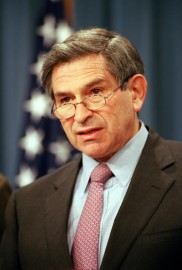
It seems that Paul Wolfowitz will be accepted as new head of the World Bank, after nomination by President George W Bush. It’s not the place of this website to discuss whether or not he is the right man for the job – there are plenty of other places to do that. There are, however, a couple of aspects of the whole process that are worth commenting on in the context of the debate about the European constitution.
The first is the very fact that this is a political issue at all. The choice of who should run an international financial institution shows that political questions are not limited to the national level. Despite its name, the World Bank is not a bank but an institution of government. It deploys public funds to achieve development objectives, and its decision-makers all represent national governments.
It is an interesting straw in the wind that so many people have said that the job of World Bank president should be subject to some kind of open competition rather than a simple nomination by a single member state. It shows that people in different countries have interests in common that their national governments cannot, on their own completely satisfy. This is true in Europe, hence the European Union, and it is becoming apparent elsewhere, too,
Secondly, there is the question of who had influence on this decision. The EU was able to convene a meeting with Mr Wolfowitz to discuss his views and plans, so that each national government could take part in the discussion. While in Europe, Mr Wolfowitz did not feel the need to pass by any other national governments to present his credentials a discussion with the EU was enough.
It is more and more apparent that, on the global stage, countries gain influence as part of wider groupings. The developing countries have banded together in the G20, for example, and the Cairns Group represents agricultural exporters within the WTO. The post of European foreign minister, foreseen in the constitution, will enable the EU to be, more effective in the same way.
The whole business of decision-making at the global level is rather unsatisfactory right now. The European constitution will make the EU’s contribution to it that little bit better.
This blog entry first appeared on www.yes-campaign.net. The opinions expressed are those of the author and not necessarily those of Federal Union or of the Yes campaign.
